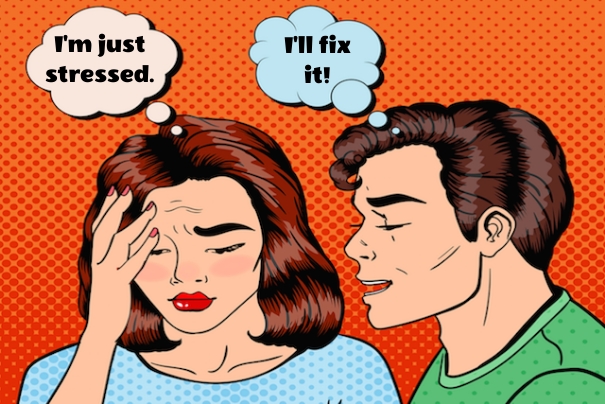
“Rather than being your thoughts and emotions, be the awareness behind them.” ~Eckhart Tolle
“I don’t believe you,” I jutted out my chin like a petulant toddler. Collapsing back into the tufted leather loveseat, I conceded, “I want to believe you, but I can’t.”
My therapist had just explained to me that I am not responsible for regulating other people’s emotions. My mind couldn’t process this truth.
There were too many decades of owning the moods of those around me.
In my younger years, if a parent was stressed, I felt it was up to me to calm them down. I prided myself on acting as a mediator between my siblings.
In high school, I drove my boyfriend crazy trying to cheer him up when he was in pain from frequent sports injuries. Later, I would allow other boyfriends to dictate how I was feeling each day, according to their mood.
And here my therapist was pointing out that it wasn’t up to me to help other people regulate their emotions. I had been doing it wrong all these years.
Undoing “Good Daughter” Habits
If you struggle with this, like me, chances are there was some chaos in your early years. I’m not necessarily talking about major trauma (although that may have occurred), but as a child you found yourself trying to compensate for the emotions of those around you.
The good news is that you can break free from this habit.
Trust me. It’s necessary for your mental health and for the well-being of your relationship to let this go.
As my therapist would say, even within a marriage it’s not my job to regulate the emotions of my spouse. I’m responsible for my own emotions. And it turns out that I’m not very good at helping “fix” my husband when he is stressed.
Changing the Dynamic
My first chance to change this pattern came in the form of a Saturday breakfast at a local coffee shop.
You know that feeling you get when you place your order with a trainee, and you have zero confidence that you are going to get what you ordered? It was one of those situations.
Thirty minutes later, our order still hadn’t arrived. My husband was getting agitated, and I could feel my blood pressure rising in response. It suddenly occurred to me that this was my big opportunity to approach things differently.
Step 1: Observe.
I noticed my husband was grumpy. I watched his scowl and listened to him mutter.
I noticed my heart race. I noticed that I wanted to say something to make it better.
I also noticed that I wasn’t upset about our food order. I had my coffee. I was okay to wait.
It was my husband who was upset, not me.
Step 2: Own your emotions.
If I am feeling stressed, I know how to calm myself down: pay attention to my breathing, reframe, and refocus.
But in this situation, if I were by myself I would have been fine. So there was nothing that I needed to do at that moment to deal with my own emotions.
I just needed to fight my urge to take on my husband’s frustration.
Step 3: Give the other person space to regulate themselves.
“Are you mad?” I timidly asked my husband.
“Nope,” he said, “just hungry.”
“Okay. I’m gonna just sip my coffee and read.”
“Thank you for not trying to fix me. I will be better after I eat,” my husband mumbled as he scrolled on his phone.
Ouch. I actually got thanked for leaving him alone. Further reinforcement that I would have been making it worse by taking on his frustration.
Step 4: Relax.
The world is not going to end if my husband is “hangry.”
My brain was trying to tell me that I was in danger, but sometimes our brains give us the wrong information.
My husband is a mild-mannered man. We’ve fought less than five times in fifteen years together—and it was me doing the yelling. I was definitely not in danger.
I was okay. He was going to be okay.
I just needed to let go of my fear that something would go horribly wrong if I didn’t intervene.
And guess what?
Everything was okay.
An Exercise in Humility
It’s hard to let go.
But the key insight in this process is that, even within a committed relationship, each person is responsible for themselves. We must give each other the opportunity to manage our own emotions.
If you are with somebody who doesn’t have the skills to regulate themselves, that’s a separate conversation. Do they want to learn those skills? How would they prefer to learn: a therapist, a book, or a trusted coach? Even so, it’s not your job to force them to acquire those skills.
We can only own our behavior. The world does not rest on our shoulders.
And the irony is, when we step back and let go of control, the fear starts to go away. We feel freer to relax.
Practice Makes Perfect
I encourage you to think of the last time that you tried to compensate for your partner’s frustration or stress. Think about what you could have done differently, now that you are more aware.
Even if you don’t manage to navigate all four steps smoothly, reflect afterward what went wrong and decide what you will do differently next time.
You’ve got this.
About Jill Dahl
Jill Dahl is the founder of Secondhand Therapy, an online resource for people who desire emotional wellbeing, but cannot commit to working with a licensed therapist. Secondhand Therapy provides down-to-earth methods to achieve a happier and more authentic life. Click here to download the free eBook: “Start Investing in Your Emotional Wellbeing: 25 Practical Tips to Move Beyond Survival Mode”













 Though I run this site, it is not mine. It's ours. It's not about me. It's about us. Your stories and your wisdom are just as meaningful as mine.
Though I run this site, it is not mine. It's ours. It's not about me. It's about us. Your stories and your wisdom are just as meaningful as mine.
Hi Jill,
I need this the most.
I really appreciate you sharing this experience.
I too had the tendency to fix other people’s emotions.
I am a highly sensitive person. When I was a kid and I saw my parents fought, I felt hopeless, helpless, frustrated, and scared. I did not tell them how I felt because I did not how to, I was not taught how to do it, I repressed most of my feelings, and I acted out most of the time.
I am still struggling with regulating my emotions and being assertive while remaining calm.
I have always been afraid of conflict because of the violent memories I endured in the past.
It is really hard and on top of it, when I saw people suffer, I just could not stand doing nothing about it.
Thank you once again for your insightful piece.
I am sure at the beginning it will be hard for me, but I am eager to learn this.
Hi Purna…I am so sorry to hear you have struggled in this area. Sending you virtual hugs and the reassurance that we are all on a journey towards figuring this out. You are not along xoxo
Hi Jill, Thanks for the making a simple concept so clear. I am not require or helpful when I try and control (as much as my intentions are to be helpful) others emotions. On the flip side, my emotions are my responsibility, no one else is responsible. Warm regards, Cathy
Hi Cathy…so glad you found it insightful xo
GREAT post!!! Thank you for going through the steps with that clear scenario….that helped a lot! Felt like you were me, that is exactly the issues I have gone through most of my life, just now managing it a somewhat..ha. Your reminder, advice, and perspectives are appreciated, thank you!!!!!! 🙂
So glad you found it helpful!!! xo
You described the first 40 or so years of my life! I was so co-dependent. I felt responsible for everyone’s happiness. It started when I was a child after my Dad left. I became my Mother’s sister, spouse, parent, child, etc. I felt totally responsible for her life. I am much better now, however, your advice was very helpful to me. I will reread it often to keep a healthy perspective in regards to my husband, adult children and other close relationships. I remember sitting in a movie theater with a friend years ago. She was very disappointed in the movie and I felt bad, guilty and responsible (even though we both chose the movie together). Now, I would not react that way (thanks to lots of therapy). Even though I still find life challenging at times (still takes work), being enlightened and informed makes things a whole lot easier these day. Thank you.
Thanks for sharing this Janice…and so glad to hear that you were able to work with a therapist (me too!) to gain perspective. Cheering for you!!!
I’m 25 now and I have this problem. I actually believe I can influence the emotions and moods of others by doing or saying something and I constantly try to do that.
Sometimes it works and I feel good. Other times I just feel bad/guilty for my inability to do it.. if I don’t take responsibility for my loved one’s feeling, I feel guilty for my apathy or selfishness.
if I practice what’s said above, how can I know if I’m really being selfish?
Most of all, I don’t want to make my loved ones feel less loved. How do I get into a healthy practice without neglecting their emotions but still remaining helpful??
Is that even possible?? 😀
Very good comment – describes me too!
For years I’ve felt responsible for the way my loved one felt about life. I had my own life to live and to this day they don’t remember the sacrifices I made in order to take away their negative emotions. All of what I did in the past drained me, left me empty, and hurt. I am grateful today, I’ve moved on and realized what I was doing to myself, with the help of my writings, prayer, and support from mature minded friends I am free! Believe it or not this person is still the same way after 20+ plus years. I’ve learned a lot about myself, this is probably what I appreciate the most about this experience, growth and realization of self.
Wow…Miesha you have gone through a courageous journey…so proud of you! How wonderful to find that inner strength while at the same time being supported by others through this process. Well done!
This is a good article, thank you. I find that it is a common problem, especially among woman? I also find that some expect others to ‘fix’ their emotions or blame others for how they feel and this is another 100 articles! Lol. I find that if people can own how they are feeling but also use words to express it to others in their company to help others to not feel responsible. I say to my partner, I feel angry or upset but it’s my feelings about the situation, nothing about ‘her’ then she can let me deal with it. The same goes the other way. It works great for us, especially since I have. Mental illness… This is very important.
Thanks so much for sharing, Penny. Struggling with mental illness is an extra complicating factor…I am cheering you on for having the courage to articulate this to your partner! xo
My gosh I can say for a good portion of my 42years of living this was me. I unfortunately as a little girl had a father who obtained a drug habit which in turn made him abusive to my Mother and me being a sensitive shy person naively believed I was responsible for others happiness. Light bulb didnt come on until I started seeing a therapist for counseling in my 40’s. Best thing I could ever do for me. I cleaned house of any takers and users and learned that the only persons emotions I needed to be over was my owns. I was such a door mat and had no self worth. I had put so many people over me and just didnt think anything of myself. Now I am really alive. Thank God
Great article, this really resonated with me.
Good to hear someone tell me this. I think I kind of know it, but doesn’t mean I practice it. It is extremely frustrating when you try to be someone’s savior, reaching out to them without them asking, trying to make it all better. Seems like they see it as interference and intrusion. Which makes me feel unappreciated and defeated. Why did I waste the effort? What was the point? Seems so much better than not doing anything, but maybe it’s better to do nothing unless you are asked for something.
Maybe it makes people feel like you’re telling them they’re wrong for feeling the way they do, even if it is a little extreme. I don’t like it either if people tell me to calm down when I believe I have the right to be mad!
However….if trying to do something good makes you feel anything but, it’s obviously not working. I need to remember this – if I don’t help, it doesn’t mean I don’t care, but I can’t live my life for someone else. Especially if they really don’t want me to.
I am a 25 year old guy. When I was a child I was the “father” for my then stressed mother.
And I kinda carried that habits with me. I have tried to “fix” many girl’s problem. Heck I still do.
My mind see it as “caring” or “loving”. Though I have learned to practice what’s said in the article overtime (Instead of “doing” anything for them, I just give them a good old fashioned “hearing”) my mind feels guilty for not ‘trying to fix” their problem.
It makes me want to question my own commitment to their relationship. This happens not just with romantic relationships but with every other close relationships.
I already feel bad for being the only guy in this discussion. anyway… wth!.. help me ladies.. 😀 What’s the right way of approaching this ??
How about when you feel the persons anger/ emotions are because of a perceived way they think you have treated them? It always feels like it is my fault. How do you deal with it then? Try and identify why it isn’t your fault? (which usually it isn’t at all!)
I actually just got to the bottom of what this means with my wife just now. I had to google what she said first. I don’t want / kneed you to fix me, it’s not your responsibility. Which some sights will say that this means that you are not responsible for my happiness which I don’t agree is the appropriate description. To my wife this meant Subconsciously ” I don’t like change, and I am responsible for my own change!
How can I read free eBook: “Start Investing in Your Emotional Wellbeing: 25 Practical Tips to Move Beyond Survival Mode”?
The link is broken and I can’t find the article on the internet, or by Googling you.
OMG – Someone just told me as a pedestrian I’m somehow responsible for anticipating and managing driver’s stress levels. LOLOLOL! I should show them this article.
That is so right. If someone says that they are offended by something you have done or said, you are not responsible for their personal feelings either. That, is their problem & they should deal with it.
I find it amazing the number of people who have been subjected to problems in their early life, have mental problems end up being Councillors helping people with mental problems. It’s a worry really, when you turn to these Councillors for help.
How long should I feel bad about myself after I hurt someone 6 months ago? I was hurt too but because I am ‘bad person’ there words not mine my feelings don’t matter. We are not in contact but this person is still saying how much I hurt them on social media.